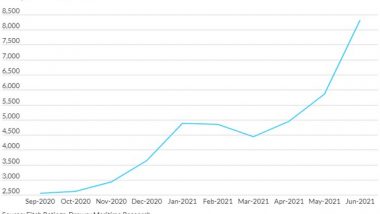London [UK], Aug 2 (ANI): Global container port congestion has increased port operators' costs and put pressure on their margins, Fitch Ratings has said.
However, the operators' performance has been supported by the strong rebound in volumes in 2H20 and 2021. "We expect bottlenecks to be resolved by 2022, although some supply chain changes could be permanent."
Fitch said demand for container transportation and trade volumes recovered sharply in 2H20 and continued to grow in 1H21 supported by increased consumption of goods, after a contraction in 1H20 when lockdowns peaked.
"We expect shipping volumes to normalise in 2022 if there are no further pandemic waves, with growth rates consistent with those in 2018-2019 and largely in line with GDP growth."
Global shipping has been battling with chaotic schedules for months due to swings in consumer demand for goods, as well as factory closures and pandemic containment measures, which have slowed down ports' operations.
As a result, there has been a shortage of empty containers in places where they are needed. This shortage has been exacerbated by the Suez blockage: roughly half the goods that pass through the Suez Canal do so on container ships.
The scale of congestion has led to significant delays in unloading. Many ports are already operating at full capacity, but storage charges at ports have increased, offsetting some ports' costs.
Some port operators are suffering lower margins due to higher processing costs caused by safety measures, greater inefficiencies and increased waiting times. Longer-term structural overcapacity in many port markets in Western Europe prevents many operators from increasing charges to cover for higher congestion-related expenses.
Strongly rebounding but unpredictable demand for goods, container shortages and port congestion have led to significantly increased shipping freight rates. Shipping lines are currently enjoying very high profitability.
For many years, overcapacity in the shipping industry led to industry consolidation, price competition, low freight rates and counterparty risk for ports. Currently, shipping companies have improved liquidity positions.
"We expect bottlenecks at ports and congestion-related effects to last until end-2021. We also expect consumer expenditure on services and experiences to recover once restrictions are lifted, resulting in a shift away from temporarily increased expenditure on goods." (ANI)
(The above story is verified and authored by ANI staff, ANI is South Asia's leading multimedia news agency with over 100 bureaus in India, South Asia and across the globe. ANI brings the latest news on Politics and Current Affairs in India & around the World, Sports, Health, Fitness, Entertainment, & News. The views appearing in the above post do not reflect the opinions of LatestLY)













 Quickly
Quickly


